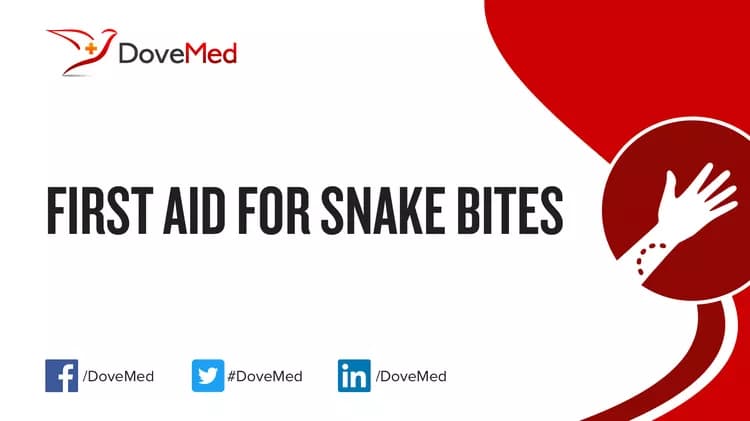What is Snake Bite?
- Snake Bites are wounds caused on contact with a snake. It is common in some parts of the world, more so in tropical countries. However, most of the snakes are not venomous to humans
- The severity of the incident depends on the snake species involved, the type of venom injected, and the site of the bite. Typically, children and older adults are affected more by the toxic effects of the venom
What are the Causes of Snake Bite?
Snakes generally bite on provocation (while defending their habitat or eggs, during the mating season), which may be unintentional or inadvertent, or when they are suddenly surprised.
A few of the venomous snakes that are known to come into common contact with humans around the world are listed below:
- Cobra
- Copper head
- Coral snake
- Rattlesnake
- Viper
- Water moccasin
Snake venom is broadly classified into neurotoxin, affecting the central nervous system, or hemotoxin, which destroy the red blood cells. The type of venom dictates the symptoms observed. However, the venom of many snakes contains components of both compounds.
What are the Signs and Symptoms of Snake Bite?
The signs and symptoms of Snake Bites depend on the species of snake involved and the venom injected. It can vary from one individual to another. The signs and symptoms also depend on the age (whether child or adult), weight, and overall health status of the individual (whether having an underlying condition or illness).
The common signs and symptoms of Snake Bites may include:
- Pain at the bite site; fang marks (a set of two puncture marks may be visible)
- Burning and swelling
- Increased thirst, vomiting
- Diarrhea
- Blurry vision
- Numbness
- Fever, sweating, rapid pulse
- Breathing difficulties
- Fainting, dizziness
How is First Aid administered for Snake Bite?
First aid tips for Snake Bites:
- Call 911 (or your local emergency help number), if the condition is life-threatening or severe symptoms are noted
- Call the Poison Control Center at 1-800-222-1222 (or your local poison control center) for further instructions
- Keep calm and AVOID any physical activity such as walking or running or shaking the affected arm/leg
- Immobilize the affected area; try to keep the affected area below the level of heart
- Wash wound with soap and water; cover it with a clean cloth or bandage
- If you are wearing any tight bracelets or rings on the affected limb or finger - take them off, since the arm or leg may get swollen and such materials may cut-off any blood supply to the region
- DO NOT cut the wound to make it bigger, or try to suck the venom out
- Consider using a splint to restrict the movement of the affected area, but avoid blocking blood flow to the region
- DO NOT apply ice, but instead put a wet cloth on the affected area
- Apply a tight bandage, slightly above the bite area to stop venom from spreading
- DO NOT take any alcoholic beverages or coffee
- Try to remember the snake’s color, shape, or any other features to help the attending physician treat the bite. Else, if safely possible, try to take the snake (alive or dead) to the visiting healthcare facility to get it identified
Who should administer First Aid?
The individual who was bitten by a snake or someone nearby can administer first aid. Immediately call 911 (or the local emergency number), if the symptoms are severe.
What is the Prognosis of Snake Bite?
- The prognosis of a Snake Bite is dependent on the type of snake involved, the venom type, site of bite, overall health of the individual, and promptness of medical response
- In many cases, the prognosis is good with prompt treatment and administration of the appropriate antivenom serum (antidote). Also, in many cases, the snake species involved may belong to a non-venomous category
How can Snake Bite be Prevented?
Snake Bites may be avoided by:
- Being alert, if you are in snake-infested regions, particularly containing dangerous species of snakes
- Carry a snake bite kit, if possible, when traveling through areas containing highly venomous snake species
- Avoiding being outdoors at night in forested areas (snakes are generally nocturnal); be careful while camping outdoors
- Avoid tall grassy areas or thick bushes; if you plan to explore the area, use heavy boots and thick pants
- Do not pick up dead snakes - they may be poisonous and still cause a bite through a reflex action
- Be cautious in areas known to have venomous snakes, especially when outdoors
- Avoid wearing clothes or shoes that have been lying around undisturbed for a while, without first inspecting them thoroughly
- Do not reach into dark nooks/corners/recesses of the house with your bare hands/foot
- Do not let clutter accumulate in various parts of the house (such as in the cellar, garage, closets, etc.)
What are certain Crucial Steps to be followed?
- Call 911 or your local emergency number, if the condition is serious
- DO NOT panic and run around, for this will cause the venom to circulate faster in the body
- DO NOT mutilate the bite site in any manner, such as by using electricity, burning the area, or incising it to drain blood
- Apply a tight bandage above the wound to prevent the venom from spreading, but DO NOT cut-off blood circulation
- Try to remember features of the snake, to help treat the condition appropriately
Related Articles
Test Your Knowledge
Asked by users
Related Centers
Related Specialties
Related Physicians
Related Procedures
Related Resources
Join DoveHubs
and connect with fellow professionals


0 Comments
Please log in to post a comment.